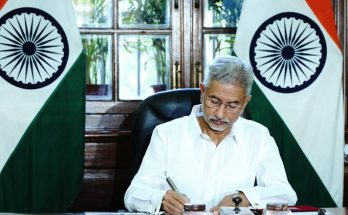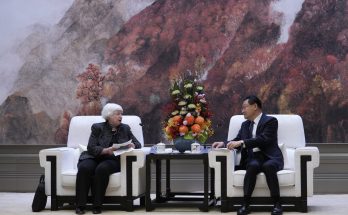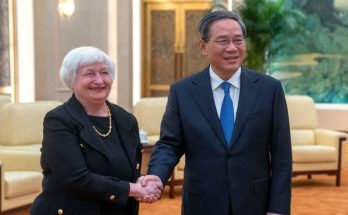 HANGZHOU (CHINA): “Hello Hangzhou,” India’s Prime Minister Narendra Modi greeted the residents of this picturesque Chinese city as he braces for a “constructive” summit of the world’s major economies and a crucial bilateral meeting with Chinese President Xi Jinping amid a stalemate over India’s membership of the NSG.
HANGZHOU (CHINA): “Hello Hangzhou,” India’s Prime Minister Narendra Modi greeted the residents of this picturesque Chinese city as he braces for a “constructive” summit of the world’s major economies and a crucial bilateral meeting with Chinese President Xi Jinping amid a stalemate over India’s membership of the NSG.
Hordes of prominent Indians living in Hangzhou greeted Mr Modi as he entered Hotel Sheraton Grand around 10.30 pm (local time) to begin a two-day visit to China. Dressed in flowing kurta pyjama, Mr Modi looked fresh and invigorated from his successful trip to Hanoi where he announced $500 million assistance for Vietnam’s military modernisation.
There are hardly 300-odd Indians in Hangzhou, but they made their presence felt as they beat drums and chanted “Modi, Modi” and “Bharat Mata ki Jai” as the prime minister went around shaking hands with them.
Putting China ties back on track
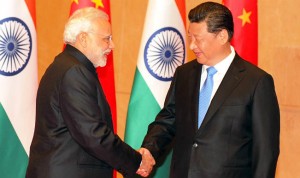 It will be a busy Sunday for PM Modi as he begins the day with what is clearly the most significant diplomatic engagement during his China trip – a meeting with the leader of the world’s second largest economy, who holds the key to India’s membership of the elite Nuclear Suppliers Group. The discussions will focus on recent irritants in bilateral ties with the thrust on restoring strategic equilibrium in this sensitive bilateral relationship that is prone to get bogged down in misunderstandings and the narrative of rivalry and competition.
It will be a busy Sunday for PM Modi as he begins the day with what is clearly the most significant diplomatic engagement during his China trip – a meeting with the leader of the world’s second largest economy, who holds the key to India’s membership of the elite Nuclear Suppliers Group. The discussions will focus on recent irritants in bilateral ties with the thrust on restoring strategic equilibrium in this sensitive bilateral relationship that is prone to get bogged down in misunderstandings and the narrative of rivalry and competition.
Mr Modi is expected to push the Chinese leader for a rethink on India’s membership of the NSG, which controls the global flow of nuclear material and equipment. India had singled out China as the sole spoiler for its failed bid to get into the NSG at the grouping’s plenary in Seoul in June. China had insisted on India signing the Non-Proliferation Treaty (NPT) as a precondition for its entry into the NSG, which was a clear deal-breaker and not acceptable to New Delhi as it regards the NPT discriminatory that divides the world into the nuclear haves and have-nots.
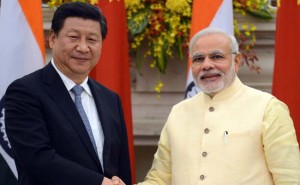 China’s stalling of India’s NSG bid has exacerbated tensions between the two Asia giants, with the narrative of rivalry gaining a fresh re-articulation in the public sphere.
China’s stalling of India’s NSG bid has exacerbated tensions between the two Asia giants, with the narrative of rivalry gaining a fresh re-articulation in the public sphere.
Against this backdrop, the two leaders are expected to hold frank discussions with possibly some secret deal-making that could pave the way for Beijing’s declaration of support for India’s NSG membership. As a way out, the two countries have started a new dialogue at the level of senior officials dealing with arms control issues in which New Delhi will address Beijing’s proliferation concerns. It remains unclear what deal will satisfy Beijing to support India’s NSG bid.
Besides NSG, Mr Modi is expected to voice concerns over the China-Pakistan Economic Corridor (CPEC) which runs through Pakistan-controlled Kashmir and amounts to impinging on India’s sovereignty claims. Mr Modi has opened a new front by raising the issue of human rights violations by Pakistan in POK, Gilgit-Baltistan and Balochistan. The reference to Balochistan has fuelled worries in Beijing as CPEC runs through the restive province of Balochistan and its security is crucial to the success of the project.
In the last few months, there are many issues that have emerged as source of friction between Asia’s second and third largest economies. China is putting India under pressure on many fronts. “China has become aggressive on its territorial claims vis-à-vis India with a Chinese diplomat recently hinting that India’s ownership of Andaman and Nicobar islands can also be questioned,” Jaydev Ranade, a well-known expert on China, told India Writes Network.
These differences are not going to go away easily, but for now the two neighbours have decided to widen the arc of convergence by supporting the G20 summit and BRICS summit. Mr Modi will meet Mr Xi for a second time in Hangzhou at a meeting of the BRICS leaders on the margins of the G20 summit. The talks in Hangzhou will set the tone for a substantive bilateral meeting between Mr Modi and the Chinese president on the margins of the BRICS summit in Goa in October.
India’s G20 priorities
The G20 summit kicks off in the Chinese city of Hangzhou on September 4, with an official meeting and group photograph of the leaders of the G20 countries which comprise over 80 per cent of global GDP.
Ahead of his visit, Mr Modi had underlined India’s support for a robust, inclusive and sustainable international economic order. In his intervention at G20 summit, Mr Modi is expected to pitch strongly for eradicating poverty and putting the global economy back on track. “We will discuss putting the global economy on the track of sustainable steady growth and responding to emerging and entrenched social, security and economic challenges,” he had said.
“India will engage constructively on all the issues before us and work towards finding solutions and taking forward the agenda for a robust, inclusive and sustainable international economic order that uplifts the socio-economic conditions of people across the world, especially those who need it most in developing countries.”
Besides holding talks with Mr Xi, PM Modi will also hold bilateral meetings with Australia’s Prime Minister Malcolm Turnbull, Saudi Arabia’s Deputy Crown Prince Mohammad bin Salman, Argentinian President Mauricio Macri and British Prime Minister Theresa May on the sidelines of the G20 summit in Hangzhou before returning to New Delhi on September 5.
(Manish Chand is Editor-in-Chief and Founder-CEO of India Writes Network, an e-magazine and journal focused on international affairs and the India Story. He is in Hangzhou to report on and analyse the G20 summit).
Author Profile

- Manish Chand is Founder-CEO and Editor-in-Chief of India Writes Network (www.indiawrites.org) and India and World, a pioneering magazine focused on international affairs. He is CEO/Director of TGII Media Private Limited, an India-based media, publishing, research and consultancy company.
Latest entries
 India and the WorldJuly 9, 2024Defying West, India sets $100 billion trade target with Russia
India and the WorldJuly 9, 2024Defying West, India sets $100 billion trade target with Russia India and the WorldJuly 5, 2024India at SCO: Takes swipe at Pakistan for cross-border terror, pushes alternative to BRI
India and the WorldJuly 5, 2024India at SCO: Takes swipe at Pakistan for cross-border terror, pushes alternative to BRI India and the WorldJune 14, 2024Modi’s Day 1 in Italy: Bonding with Britain, France
India and the WorldJune 14, 2024Modi’s Day 1 in Italy: Bonding with Britain, France India and the WorldJune 13, 2024G7 summit in Italy: Modi to showcase India as leader of Global South
India and the WorldJune 13, 2024G7 summit in Italy: Modi to showcase India as leader of Global South




